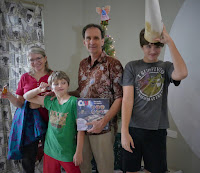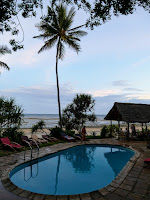 |
| David returns from his week away camping. |
There almost seemed to be a kind of spiritual dimension to us leaving the fold one-by-one. I think Rebecca felt her experience was the most rewarding in terms of what she was doing, and Oren did enjoy the numerous activities and friends at his camp. (They also stayed in cabins, not tents.) David camped in a tent and generally felt that teachers and leaders were quite bossy (not surprising given that they were in charge of a group of hyperactive 4th graders). Also camping in a tent meant that he got rolled over frequently by tent mates who slept diagonally across mattresses by the end of the night. He definitely seemed very happy and grateful to be back. We enjoyed an outing at Gymkhana where he bought several chocolate bars as a reward for his perseverence.
I, as mentioned in the last entry had the roughest time since I was very sick during the trip. I have continued to have a slow recovery to full strength and am almost, but not quite back to how I felt the week before I left.
The past two weeks of work have been interesting but labor intensive in a somewhat tedious way, as I have been coding the transcipts of many interviews and focus group discussions to learn more about decisions and preferences around delivery of Maasai women, traditional birth attendants, and their husbands. There are some fascinating discoveries that could effect our project. One significant find is that most of the women end up delivering at home, not because of a preference to do so, but because of sudden onset of labor and concern that they will deliver on the way to the clinic. When asked if they had agency to give birth where they wanted, women confirmed that they could make the decision but added that God ultimately decided because labor came on before their due date.
Other questions led to other discoveries. I was not expecting to find that men expressed a desire on average for less children than women. Most women answered the question about the number of childre desired by saying 'as many as possible'. Men overwhelmingly answered in economic terms based on the number of cows they had. The average for men was 3 and no more than 4. They also felt responsible to make sure there were 3 to 4 years between children through abstinence, withdrawal, condom use, or 'the standard days method'. They generally did not want their wives to be in charge of fertility regulation because of fear of infidelity. (The men are nomadic in certain seasons and away from home for several months at a time.)
There is a lot more to say, and hopefully it will be written up in an article by the end of April. The problem right now is that text based qualitative analysis is slow, methodical work and I have trouble doing it for more than 4 hours in a day without going crazy.
There were some highlights in the past two weeks for Rebecca and I. One of them was an early celebration of my Birthday. I took last Thursday off and Rebecca and I dropped the kids at the bus, then went swimming, followed by brunch at a resort hotel called River Trees. It was very nice and we spent an hour walking around there before heading over to Lake Duluti for another leisurely walk. We finished off at Coffee Lodge before surprising the kids by picking them up after school. It was a very relaxing day and a good opportunity for Rebecca and I to reflect on the question of what the 'manna' is that God is giving us during our time in Tanzania. (We realize it can be easy in a cross-cultural situation to kvetch about small problems and miss the work that God is doing in our lives.)
Over the weekend we hosted a movie night at our house for neighbor kids in our compound and watched the new Wreck It Ralph movie. It was fun to have two other families over to enjoy our mini projector which really makes our living room feel like a movie theater.
The following week, David went on his camping trip, and oddly, everyone working in the MCC office was either travelling for work or on vacation, so Rebecca and I were there alone. (I was completely alone on Tuesday and Thursday.) Because of the research project mentioned above it was not an altogether bad situation to have the uninterrupted time. We did go out on Monday evening for my Birhday with Oren to an Ethiopian restaurant. (Something David does not enjoy.)
Wednesday Rebecca and I had a very interesing field visit to our partner Step by Step Learning Center. Here is Rebecca's report on the visit:
This past week, Paul and I were able to share a very
positive and encouraging work experience. I had scheduled a visit to the Step
by Step Learning Center, an MCC partner offering appropriate education to a
small group of special needs students. I wanted to talk with them about future
volunteers, and the possibility of recruiting an older adult volunteer Special
Education specialist to come help mentor their teaching team. Paul, as the
education coordinator, wanted to pay them a visit as well to hear about their
new developments.
We arrived toward the end of circle time, which is a
wonderful beginning to the school day for these students, offering routine and
affirmation. They sing songs, answer questions about the date, the weather, and
so on. And then, they have a session of very simple reflexology. All of the
teachers make their way around the circle of 15 students, giving individual
attention and love to each child as they gently massage and warm up fingers and
hands. As they do these hand massages, they also sing together, recognizing
each child:
“This is how Hans oils his hands,
Oils his hands,
Oils his hands
This is how
Hans oils his hands
Early in the
morning”
The children love it. Even children on the autism
spectrum, who are wary of stimulus, welcome this positive touch. Some children
struggle with very tight muscles or twisted hands, and the massage helps them
to make more progress during the school day. It is incredibly special to be
part of this time.
After the children went to have their morning tea, the
head of the school, Margaret Kenyi, took us on a tour of the school grounds.
With a small grant from a local donor, she has been able to fence most of the
sizeable school grounds. Donations of rolls of chain-link from local hardware
wholesalers have taken the project even farther. This fence is important to
protect students who might wander, as well as the growing herd of goats. It was
incredibly gratifying to see how MCC’s seed money for small animal husbandry
has expanded. Four years ago, a grant from our organization provided for 2
goats and a handful of chickens. Now there are 22 goats and 70 chickens, as
well as two ponds for fish-farming.
Another Scandinavian donor raised money to build a new 2
bedroom staff house, next door to the original 1 bedroom house. Margaret asked
if we could come and pray for the new occupants of each house, and she
recounted these stories. For a number of years, a faithful caretaker
guard had been living in that little house. Last year, tragedy struck his
family: his wife died of an illness, and their young daughter was then taken to
live in the village with her grandmother and cousins. Meanwhile, the school has
one student, Bryson, with severe cerebral palsy, but a lot of intellectual
capacity. Bryson’s father took off soon after his was born, so he was raised by
his mother, who was scorned and ostracized because she had given birth to an
atypical child. Her life was hard, and she struggled to make ends meet, but in
the end, took to drink and died almost two years ago. Bryson’s young
half-brother, just 20 years old, took over his care. They lived together in a
tiny place in an urban slum. It was an incredible effort to carry Bryson to
meet the school bus every morning, and then meet him mid-afternoon to bring him
home. Bryson’s brother Simon couldn’t work a regular job and Margaret could see
that the situation was unsustainable. So, Simon has now been hired as a deputy
caretaker for the school, to help with all the livestock.
In the past week, the head caretaker moved into the new
house, with space for his daughter when she comes to visit. And Bryson and his
brother (and the brother’s own wife and child) moved into the original little
house. It was amazing to meet all these people, and to see how, out of broken
and tragic family situations, a new little community is being formed on the
school grounds. It was just a small taste of new creation, of God revealing the
ways that he can heal and restore. It also pointed out for me the ways that you
can’t help a single person with special needs here, without recognizing the
problems of the whole system and working on a holistic solution.
After praying for each home and its new occupants, we
went back to the school and sat with the team of teachers. It was very good to
talk with all of them together about the different options for inviting
volunteers through MCC and to get their opinions on what would be most helpful
to them. The teachers have few resources and are trying to do a lot with the
experiences and informal training they have gained over the years, with
oversight from Margaret (who does have a special education degree). An older
volunteer with training and experience would be a real blessing. We left the
visit very glad to have spent time with one of our partners and the people they
are serving.
That is all for now. The kids have half-term break this week so they are home all week. We are planning a camping trip of our own next week. Hopefully the rain will hold off where we are going, but there is not doubt that the rainy season is upon us. It is a pleasant change from the hot weather we have been having. But I do remember last year, the mud, mold, and cold became quite a trial. Hopefully it won't be quite as wet as last year.
Bonus Photo: Oren, David, and some of their friends from our small group.





















































